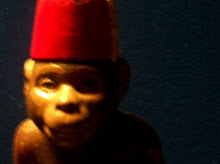This reminds me of something I've mentioned previously, Allen Guelzo on Lincoln's religiosity:
...Lincoln's moralism, far from puzzling, was driven precisely because he was "wholly wanting" in "piety." It was the mark of many Victorian unbelievers who came from pious Protestant households...to imbibe from those households a puritanical demand for earnestness and relentless truthfulness and then turn it on their own Christianity. Duty became the moral surrogate of religion. And often, it was the very high-mindedness of their honesty which led them to reject Christianity as untrue or lapse into unbelief if they felt they could not honestly describe themselves as Christians. The ethics of Protestant Christianity outlasted its theology, and almost as a compensation for the absence of faith, "infidels" like Lincoln redoubled their own pursuit of conscientiousness.I mention this because, well, I see myself reflected here. Yup, me, Lincoln and Wittgenstein: three of a kind. I'm kidding of course (though don't Lincoln and Wittgenstein seem to bear some sort of family resemblance?). What intrigues me is this Protestant worldview with all the piety removed. Or at least all the theological specifics that we associate with piety: take God out of the picture, mind you this leaves a big hole and an acute sense of absence, and even if you cling to some distant, inscrutable and unknowable God you can still go ahead and forget all about trinities and Christologies and other strange Greek formulas. And what's left? The grotesquely, absurdly ethical? A puritanical demand for earnestness and relentless truthfulness that turns on itself?
Yeah, that, and superstition for the agnostic, always on the lookout for those potential signs of salvation and damnation in a universe seemingly devoid of any such notions.


